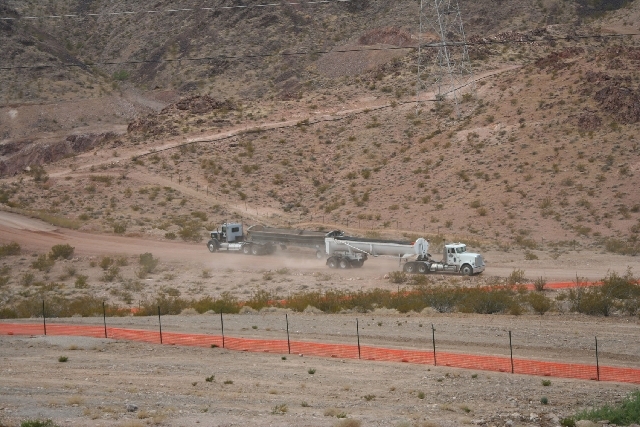
It doesn’t make sense to build the second phase of the Interstate 11 loop without making sure the first phase is completed at the same time to connect.
The first phase of the I-11 loop, formerly known as the Boulder City Bypass, is in the early stages with road construction possibly beginning late this year and taking until nearly the year 2020.
However, with the Regional Transportation Commission of Southern Nevada telling the City Council last week that construction on the second phase could start next fall and finish in 2017, the construction timeline of the connecting phase by Railroad Pass would have to be pushed up.
“It would force us to finish phase one because you can’t have a phase two without that phase one,” said Tony Lorenzi, senior project manager for the Nevada Transportation Department. “It would force us to hurry up and finish our portion.”
Phase one is being overseen by the department and phase two is being administered by the Transportation Commission.
Funding of the $300 million second phase hinges on a proposed fuel-tax increase that needs the approval of the Clark County Commission. If approved, the Transportation Commission would take $700 million to $800 million in bonds that would be paid back with future tax revenue.
Nearly $230 million of that funding would go toward the I-11 loop second phase.
Phase one is the realignment of U.S. Highway 93/95 by Railroad Pass, which would include removing the stoplight in front of the casino. The stoplight can cause traffic back up toward Boulder City during Friday evenings and holiday weekends.
“The main benefit of phase one if the removal of that half-signal,” Lorenzi said. “It’s a very dangerous intersection, it’s a high-crash location.”
Phase one will pull the highway away from the casino, which will improve traffic flow especially for tractor-trailers.
Lorenzi said $32 million in construction of the connector from the Railroad Pass interchange to U.S. 95 where the loop would begin in the phase one plans could move to phase two.
“We’re meeting with the RTC to see how we can integrate phase one into phase two and get the whole (I-11) built,” he said.
The department also meets with the Federal Highway Administration, which is studying an I-11 corridor from Phoenix to Las Vegas.
According to Lorenzi, right-of-way acquisitions are nearly complete with the state attorney general’s office negotiating right-of-way acquisitions for the first phase, including the three-acre portion controlled by Jericho Heights, as well as land held by Railroad Pass Casino and K&L Dirt.
“Our goal is to settle it before it even goes to court,” Lorenzi said. The cost of acquisition, which was budgeted at $20 million to $30 million, could be nearly $60 million.
However, the state does not have to wait for the settlements to be complete before the project can begin road construction.
“We could build the project tomorrow,” Lorenzi said. “It’s just a matter of how much money are those three owners going to get.”
The department began plant salvaging and tortoise fencing in January, a $1.5 million project that should be completed soon.
Lorenzi said more than 20,000 endangered species plants that are being harvested in a nursery off U.S. 95. They will be replanted during the frontage road construction that will go from Foothill to Railroad Pass.